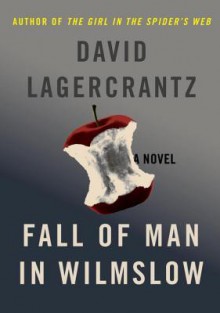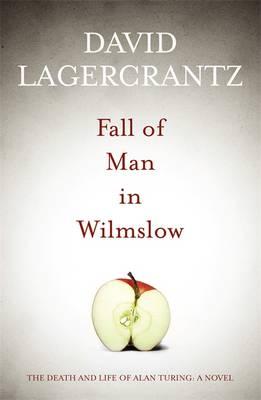
Honestly, I spent the entirety of this book fully convinced I was reading a nonfiction book about Alan Turing from the point of view of the policeman who found his body. Good job, David Lagercrantz! You totally fooled me! The book in question is Fall of Man in Wilmslow and it's the fictionalized story of Alan Turing's suicide and his contribution to the war effort and to numerous academic disciplines. Over the last year or more, I've been pretty much obsessed with all things A.I. and as a result I've learned a great deal about Alan Turing (and I've talked about him a few times here if you remember) who is considered the father of the modern computer AND Artificial Intelligence. What a guy! As a result, I'm pretty familiar with the biographical points of his life and his death. That's partially why I thought this was a work of nonfiction because all of those facts were laid out...which is the perfect way to build a fantastic piece of historical fiction. Lagercrantz used just enough of the truth to weave a convincing story about what might have happened had the policeman who found him been somewhat like Turing himself. Detective Constable Leonard Corell is the first officer on the scene and at first he is disgusted by not only the act of suicide itself but the man who committed it. This disgust turns into a kind of rage when he discovers that Turing was convicted of homosexuality. Even his initial aversion doesn't tamp down his horror at the punishment meted out by the government however. (He was chemically castrated which many believe was the main reason he chose to end his life as it led to severe depression.) Corell is an odd character. He flip flops between being overconfident in his abilities to allowing himself to be railroaded by his peers and bosses. He's also constantly daydreaming which I found tiring by the end of the novel. Speaking of the end of the novel, I didn't like it. It felt like the book was building and building and then the end was such a letdown. I can't say more about it without giving away huge spoilers but let's just say it was closely tied into Corell's daydreams. If you're completely unfamiliar with Turing and his work then this is an interesting way to get clued in because as I said much of the story is completely factual. Excepting the end, I really did enjoy this book. Lagercrantz is an excellent storyteller and he fooled me into thinking this was entirely plausible. 8/10 because that ending bummed me out.
Photo source: abebooks.com


 Log in with Facebook
Log in with Facebook 





